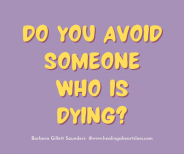“Oh, no” may be first thought that comes to mind when you realize someone is dying. The accompanying feeling of hollowness in the pit of your stomach may set the stage for subsequent decisions and choices made when asking the question, “What do I do now?” For many people, avoidance is the popular solution.
Avoidance can be due to several reasons such as;
- Feeling uncomfortable near a dying person
- Fear of not knowing what to say or how to act
- Triggers or reminders of your own experiences of loss (perhaps unresolved)
- Not wanting to upset anyone
- Not wanting to be upset in front of someone else
- Too busy or that is what you tell yourself
- Do not want to be in the room alone with someone who is dying
- Not wanting to see the dying person in pain
- Not wanting to have this memory of the dying person
- Guilt, for whatever reason
- Do not want to say “good-bye” or can’t
- Belief system
- Worthiness or feeling not worthy to be near the dying person
Everyone is different in how they deal with death and dying.
I realize there are legitimate reasons for not being with someone who is dying and there are times when a dying individual does not want someone there. Sometimes, family discord prevents people from doing, saying or behaving in a certain manor for fear of how things will be perceived.
For a moment, put “YOU” in the dying person’s position, what does this feel like when few people come to visit or no one comes? Age may have a part to play here also.
- Isolated
- Lonely
- Sad
- Rejected
Many of us will feel or have felt this isolation, loneliness and sadness after a loss but for the dying individual, who is alone, perhaps fearful of what is to come, just knowing someone is there by their side may speak volumes without saying a word.
Consider for a moment the physical changes of someone who is slowly dying. Many individuals do not want to see their loved one gradually diminish in stature. This can hold true for someone who has been in an accident or other situations.
Have you heard the comment, “I want to remember them when they were doing better, not how they are now, dying?”
An important point to consider is… NONE OF US ARE GETTING OUT OF HERE ALIVE!
Another point to ponder is we cannot take our “stuff” with us. To put it bluntly DEAD IS DEAD!
All my best
Barbara Gillett Saunders
Grief Counsellor/Thanatology

